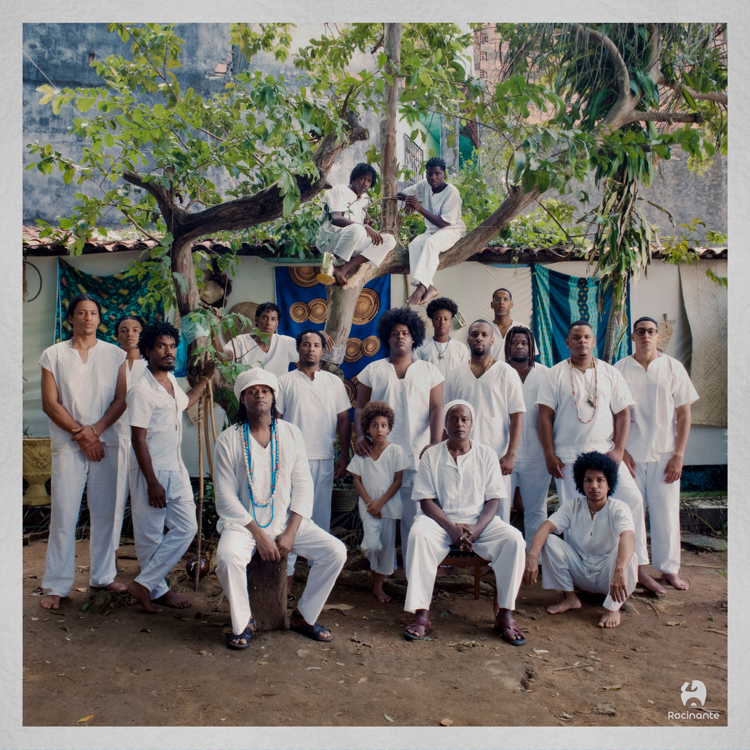Aguidavi do Jêje – Aguidavi do Jêje (Rocinante, 2023)
Presented by the Rocinante label, the debut album of the Aguidavi do Jêje ensemble stands as a profound manifestation of positive energies. From Bahia, this Afro-percussive group enthralls listeners with a seamless fusion of tradition and avant-garde elements, creating a compelling dialogue between the past and the present. Embracing the candomblé rhythms of the Jeje-Mahin nation, their atabaque orchestra defines itself as a “percussive ritual.”
Executed with meticulous precision and steeped in ancestral roots, the music on this fascinating album serves as a testament to heritage and tradition. The very essence of the group is encapsulated in its name: aguidavi, derived from the stick taken from the Araçá tree, instrumental in playing the three atabaques in the candomblé rituals of Jeje-Mahin. Jeje references Africans originating from the kingdom of Dahomey, modern-day Benin, while the Ogans are individuals trained to play the sacred atabaques – rum, rumpi, and lé – during ceremonies.
Under the leadership of percussionist and composer Luizinho do Jêje, the eponymous Aguidavi do Jêje album presents eight original tracks recorded live at Terreiro de Bogum in Salvador. Notably, the album features the participation of Brazilian music’s living orisha, Gilberto Gil, in the track “Violão de Cabaça.”
The sacred resonance of drums and atabaque invokes the voduns, meaning spirits in the Fon, Gun, and Ewe languages, resulting in a sound conducted with precision and deeply rooted in ancestry. With a lineup comprising 18 percussionists, including several ogans from the historic Terreiro do Bogum, the album is a celebration of the Jejê-Mahin tradition, masterfully led by Luizinho do Jêje. Born and raised in Bogum, Luizinho is a seasoned master of atabaques, with a rich history of playing percussion for renowned artists.
Beyond highlighting the collective talent of Aguidavi’s members, including Kainã do Jêje, Luizinho’s son and percussionist for Caetano Veloso and Ivete Sangalo; Tiago Nunes, collaborator with Bel Marques; Ícaro Sá, from Baiana System; and Lucas Maciel, a member of Orkestra Rumpilezz, the album pays homage to Afro-Brazilian culture and popular music. Recorded live at Terreiro do Bogum in the heart of the Engenho Velho da Federação neighborhood in Salvador, the album reverently honors the roots of Afro-Brazilian culture.
The participation of Gilberto Gil in the album, particularly in the track “Violão de Cabaça,” brings forth a unique blend of bold berimbau compositions and atabaque rhythms, creating a jubilant and fervent atmosphere. Luizinho expresses immense joy at Gil’s contribution, emphasizing that it fortifies the essence of Aguidavi.
In addition to Gil, the samba “Salve os caboclos” features Carlinhos Sete Cordas, adding brilliance to Luizinho’s guitar. Despite its intrinsic connection to Bogum, the album transcends geographical boundaries, serving as a jubilant celebration of Afro-Brazilian culture and popular music. Luizinho underscores that it’s not just an album but a festivity, seamlessly combining roots music enriched with potent lyrics, rhythms, and energy.
The album represents a fusion of Brazilian music’s inventiveness with the reverence for ancestry, guiding each Ogan’s path. It encapsulates the sacred rhythms of the Jejê tradition, delivering an enchanted and immersive musical experience. Luizinho do Jêje’s Aguidavi stands as a joyous celebration of African Brazil, harmoniously combining traditional instruments with modern elements, resulting in a rhythmic and melodic masterpiece.
The album’s repertoire offers a rhythmic and melodic journey, featuring the handmade gourd guitar and embracing both jêje and nagô influences. The lyrics by Luizinho do Jêje and his collaborators enhance the ritual with evocative onomatopoeias, connecting the listener to the traditions of Dahomey. Despite ethnic and linguistic distinctions, the album celebrates a union of orixás and voduns, reflecting the powerful Jeje-Nagô heritage crafted by Olodumare and Mawu-Lissá. Luizinho do Jêje and his musicians present a festive and mysterious musical experience, transcending cultural boundaries.
Under the artistic direction and musical production of Luizinho do Jêje, Tiago Nunes, Kainã do Jêje, and Sylvio Fraga, the album’s recordings at Terreiro were meticulously complemented at the Rocinante Studio. The ensemble comprises exceptionally talented individuals, each contributing to the sound that Aguidavi do Jêje proudly presents to the world.
Mãe Runhó: vocals; Dona Odessi on vocals; Luizinho do Jêje on atabaque, effects, and vocals; Carlinhos 7 Cordas on guitar; Alan Teles on rum and effects; Danilo Jesus on agogô and effects; Danilo T’challa on agogô and effects; Gabriel Santana on pi and effects; Ícaro Sá on pi, effects, and SPdS; Jadson Xabla on rum and effects; Jeferson Chagas on agogô and effects; Kainã do Jêje on atabaqueria and effects; Kaique Mello on pi and effects; Lídio Alves on pi and effects; Lucas Maciel on quatro runs, effects, and octapad; Negokiri on pi and effects; Nem Cardoso on pi, effects, and vocals; Paulinho Music on agogô and effects; Raysson Lima on rum, effects, and xequerê; Tiago Nunes on surdos, effects, xequerê, and SPdS; Enzo Xablinha on lé.
Buy Aguidavi do Jêje.


